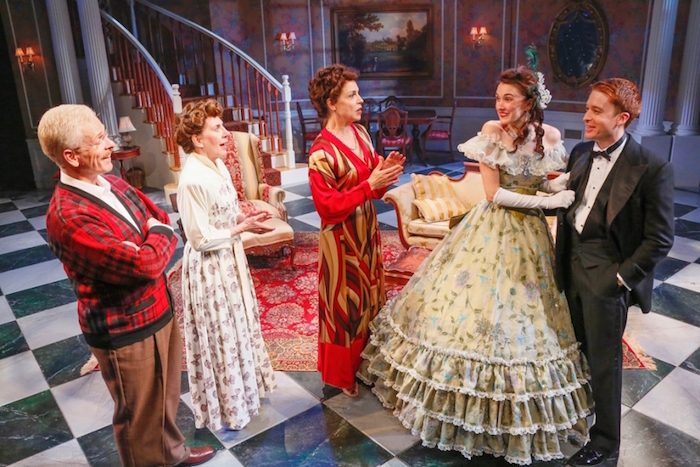Theater Review: 'The Last Night of Ballyhoo' at Bay Street Theater

For most of the characters in Bay Street Theater’s The Last Night of Ballyhoo by Alfred Uhry, Judaism is less a faith than it is a given circumstance—they were born that way, so it’s best to just address it and move on. A romantic comedy set in Atlanta, Georgia in December, 1939 in the home of the well-to-do German Jewish Levy/Freitag family, The Last Night of Ballyhoo often feels like a sweet trifle from a more innocent time—until the colorful characters are forced to face uneasy truths about faith, social standing and class.
Boo Levy (Ellen Harvey), a widow who lives with her brother Adolph Freitag (John Hickok) and widowed sister-in-law Reba Freitag (Dori Legg), is desperate to find a suitable gentleman to take her immature, starry-eyed daughter Lala (Erin Neufer) to the Ballyhoo, the biggest festival and dance of the year at their Jewish country club. Lala, constantly at odds with her harsh mother, has lived at home for years since dropping out of college after a vague incident and would rather talk about more important things, like the Gone with the Wind movie premiere. Adolph’s new assistant, charming Brooklyn transplant Joe Farkas (Ari Brand), meets and falls head over heels for Reba’s intellectual and beautiful daughter Sunny (Amanda Kristin Nichols), while Boo scrambles to snag wealthy Louisiana boy Peachy Weil (Daniel Abeles) as Lala’s date.

The wonder of Ballyhoo is how fresh it feels, despite the liberal use of familiar tropes and conventions. Lala is jealous of the more secure, stable Sunny, but their sibling-like argument takes a surprisingly serious turn when Lala cries about “looking” more Jewish than her blonde cousin. Boo doesn’t approve of the less-refined Joe, but it’s not his lack of Southern manners; it’s his pride in growing up in a traditional Jewish household, as opposed to assimilating into what she perceives as more polite society. The undercurrent of self-hate and shame gives Ballyhoo a modern relevance that intentionally conflicts with the Technicolor story unfolding on stage, and the play is all the more memorable for it.
The performances are strong across the board. As Boo, Harvey is both infuriating and extremely sympathetic. You’ll wince at some of the things Boo says—her use of one particular derogatory term will surprise you—but Harvey’s layered performance will make sure you understand where she’s coming from. Neufer is a delight as Lala, a dreamer who would rather fantasize than actually go out and make a life for herself.
And Abeles, with a deep Southern drawl, is downright charming as the smarmy but oddly endearing Peachy, giving the character an ironic, self-aware ignorance—Peachy may say rude things and revel in his old money lifestyle, but there’s a sense that he knows exactly how he comes across and is completely okay with it. As the fish-out-of-water Joe, Brand nails the “nice Jewish boy;” plenty of people are going to wish they had a Joe to set up with their kids or grandkids.
Directed with a playful touch by Will Pomerantz, the production of Ballyhoo is as charming as its characters. Alexander Dodge’s set, which at first appears to be a traditional single interior, has a surprise or two that adds spectacle to the proceedings. The production design nails the period, be it sound designer Jane Shaw’s clever use of music or the lovely costumes by Lindsay W. Davis.

It’s easy to predict a happy ending in The Last Night of Ballyhoo, which is all too rare for a play about religious issues written in 1996, but Uhry is careful to remind the audience that just because the central conflicts are resolved, things may not always be smooth sailing. An exchange late in the play between Adolph and Boo in which the siblings discuss how different they thought their lives would be is a poignant moment. And the final scene, which won’t be spoiled here, is quietly powerful and very satisfying.
The Last Night of Ballyhoo runs through July 24 at Bay Street Theater and Sag Harbor Center for the Arts. For tickets and more information, call 631-725-9500 and visit baystreet.org.



